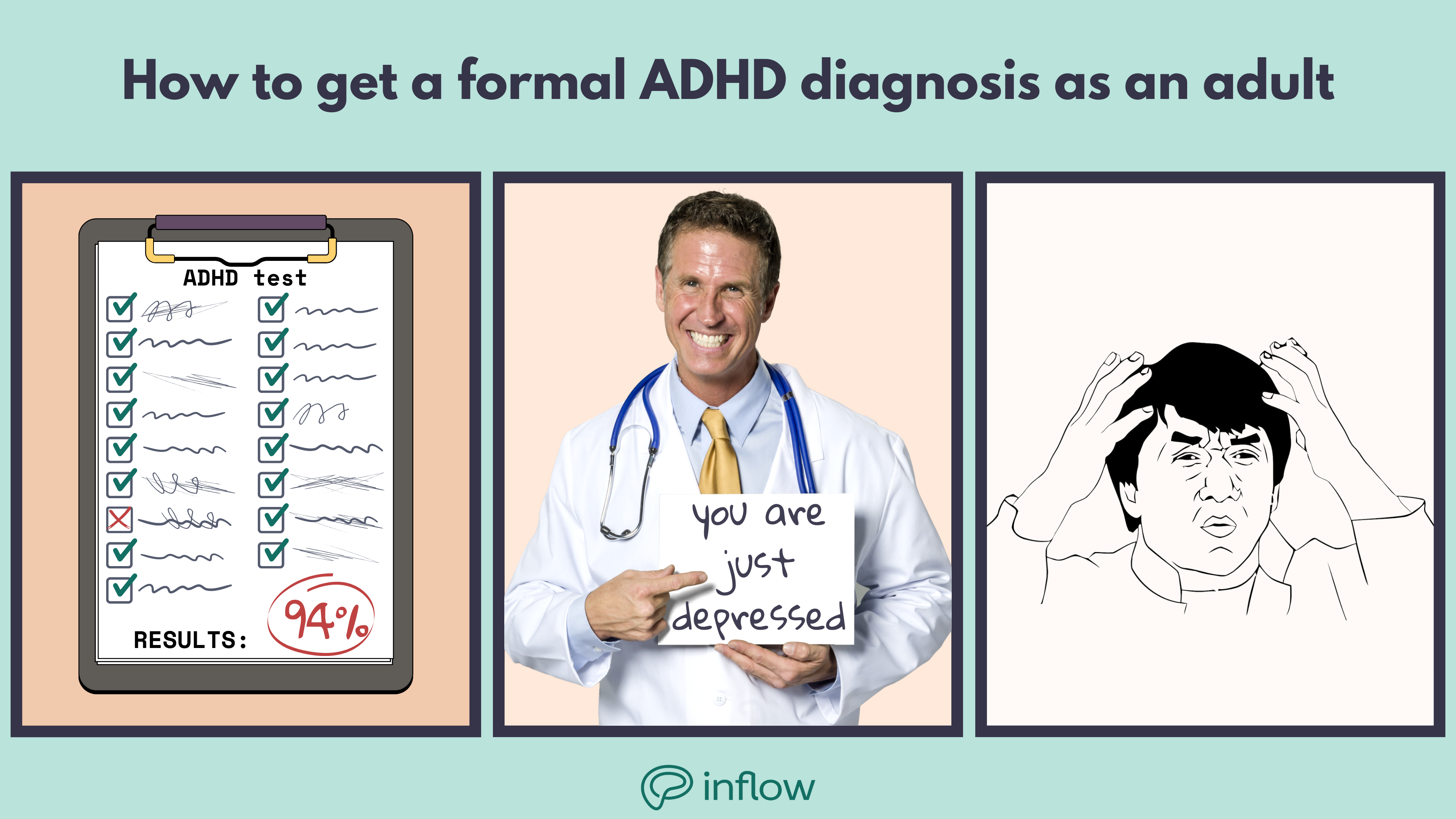Trying to figure out which medical professional you should visit for an ADHD diagnosis? While most physicians are technically qualified to diagnose attention-deficit/hyperactivity disorder (ADHD, formerly “ADD”), it is important to seek out a professional with experience in diagnosing and treating adults with ADHD. In most cases, that's a mental health professional or psychiatrist.
The journey to an ADHD diagnosis often starts in your primary care provider’s office. Almost never will it end there. This article takes you through the steps of receiving an ADHD diagnosis and explains the specific roles of the different medical professionals you may encounter along the way.
Too long; didn’t read
- If you suspect that you might have ADHD, seek a professional evaluation from one of the doctors listed above. And - remember to prioritize experience in treating adult ADHD over their specialist title.
- I’m one of the lucky ones, and I don't take that for granted. I’ve been living with an ADHD diagnosis for most of my life—I can’t imagine how difficult everything would have been throughout the years if I didn’t know I had ADHD.
- Don’t give up on your search for the right professional! Nothing compares to the "aha!" moment when you know for sure that you're neurodiverse—everything will finally make sense, and the journey will have been worth it.
---
For a list of additional resources, check out CHADD’s (Children and Adults with ADHD) page on finding professionals who diagnose and treat adult ADHD.
The problem with adult ADHD diagnoses
Sadly, it's not yet standard procedure for medical professionals to consider the possibility of ADHD if the patient doesn’t specifically ask about it—especially with adults.
Undiagnosed ADHD in adults
An estimated 20% of adults with ADHD never get diagnosed.1 Additionally, ADHD can be overshadowed by many overlapping symptoms with comorbid psychiatric conditions, which interferes with formal ADHD diagnoses.2
In other words - if you have undiagnosed ADHD, there’s a high chance that a doctor would take one look at you and say, “maybe it’s depression.”

Comorbid conditions can mask ADHD
For many adults in this situation, their ADHD is overlooked because of those shared symptoms; and because it's not standard procedure to screen for ADHD, it will go undetected.
The same happened to me as a child. My psychologist referred me to a clinic for an evaluation, where they decided not to diagnose me with ADHD. Instead, they diagnosed me with an adjustment disorder because of my parents’ divorce. Later, several psychologists said I “undoubtedly have ADHD,” and scoffed at the clinic’s initial diagnosis.
This goes to show how important it is to find a suitable professional—for any diagnosis, but especially for ADHD.
Disclaimer: This doesn’t mean that you should go around to every doctor in a 100-mile radius until you find somebody to give you the diagnosis you want. If several qualified professionals come to the same conclusion - trust it!
Who can evaluate and diagnose adults with ADHD?
A variety of medical professionals and physicians can be involved in the process of treating ADHD that's already been diagnosed—unfortunately, options are limited when it comes to actually receiving the diagnosis.
Below is a list of medical professionals you should be able to seek advice from regarding your ADHD diagnosis journey.

Your regular doctor or nurse
The person you typically visit when you have a virus or a general check-up (your Primary Care Provider) may be qualified to evaluate you for an ADHD diagnosis; however, everyone's credentials, so it's always a good idea to ask first. Professional titles in this category include:
- Primary Care Providers (PCP), or Family Physicians
- Nurse Practitioners (NP)
- General Practitioners (GP)
- Physician Assistant or Physician Associate (PA)
The role of a primary care provider in the ADHD diagnosis process is often limited to providing specialist referrals. Of course, some general practitioners may have professional experience in the psychiatric field as well - in which case, you may be evaluated sooner.
If the primary care provider offers to evaluate you, ask for the process details. There's no single test or process that can definitively prove that someone does or does not have a mental health condition, which is why it's recommended that more than one method is used to confirm an ADHD diagnosis.3
Having one interview or filling out a single questionnaire is not a reliable way to determine your state. In those cases, it'd be wise to ask for a specialist referral.
Nevertheless, you may need to fill out a questionnaire provided by the primary care physician to be forwarded to whoever continues your evaluation and diagnosis.
Mental health professionals

Mental health professionals play a big role in the ADHD diagnosis process—so long as they have credentials for diagnosing patients.
Examples of mental health professionals that can diagnose ADHD include:
- Therapists
- Psychologists
- Master's level counselors
- Clinical social workers
A therapist, for example, can gain a deeper understanding of the specific symptoms that impact your day-to-day life during a casual diagnostic interview. Their questions are standardized in order to minimize the chances that another professional would come to opposing conclusions.
Important to note: The diagnosis will not come right away.
Depending on which part of the planet you reside on, the people that frequently interact with you may also be asked to provide information about your behavior. This is usually done in interviews and/or questionnaire format. (This doesn't always happen, but it is standard procedure in some countries.)
Psychiatrists
Your ADHD evaluation may also include a psychiatric interview to determine if you have other comorbid conditions, which are conditions that co-occur in a single patient; because ADHD rarely occurs alone.
For example, depression, generalized anxiety disorder, learning disabilities, and a tendency toward substance abuse are very common comorbidities, and it's important to have a full grasp of your mental health state when seeking any diagnosis.
Neurologists
Only a small percentage of neurologists specialize in ADHD, and even smaller amount are qualified to evaluate and diagnose the condition. However, some may benefit from a neurology evaluation if they have personal or family history of seizures, or if anyone in their family has been diagnosed with neurodegenerative diseases, such as Parkinson's4 and Alzheimer's.
In these cases, it's important to rule out any conditions that may be contributing to symptomology.
But because neurologist visits generally come with a higher out-of-pocket cost—especially in recent years—neurologists are a less-desired route for the average adult on their ADHD diagnosis journey.
Pediatricians
If you notice ADHD symptoms in your child - or you have ADHD as their parent and you’re curious if your child is also neurodiverse - then a pediatrician is the right professional to talk to.
ADHD diagnosis journeys come in all shapes and sizes
Because the DSM-V criteria for ADHD are mostly based on the experiences of children, it's harder to diagnose ADHD in adults. Therefore, the most important part of your search for a professional to diagnose ADHD is to find one with experience in doing just that.
A doctor’s specialty is of second rate importance if they are not fully educated on adult ADHD. In fact, specialists are more likely to overestimate the quality of treatment they provide to adult patients with ADHD5, which can lead you to a dead-end on your search for answers.
Why is ADHD underdiagnosed in adults?

Adults typically have more roadblocks than children when seeking a formal diagnosis, and the reasons are related to one or more of the following problems:
Stereotypes
There are three subtypes of ADHD, and everyone has unique symptom presentations. A stereotypical or misinformed understanding of how ADHD manifests in adults may delay a diagnosis.
Overlapping symptoms with comorbidities
ADHD symptoms heavily overlap with many conditions, the most common of which include: depression, anxiety, bipolar disorder, autism, and PTSD (post-traumatic stress disorder). These overlaps can cause a misdiagnosis and/or leave ADHD undiagnosed.6
Gender bias
Along the same lines as the first roadblock - stereotypes - gender bias can delay or block an ADHD diagnosis because of misinformation regarding what ADHD looks like in women, leading to a gender gap in ADHD diagnoses.
Exclusions in medical research
Adults are finally starting to be included more frequently in research studies on ADHD compared to previous decades,7 but the vast majority of what we know about ADHD is based on children—specifically those who are white, male, middle-class, and American.


.jpeg)




